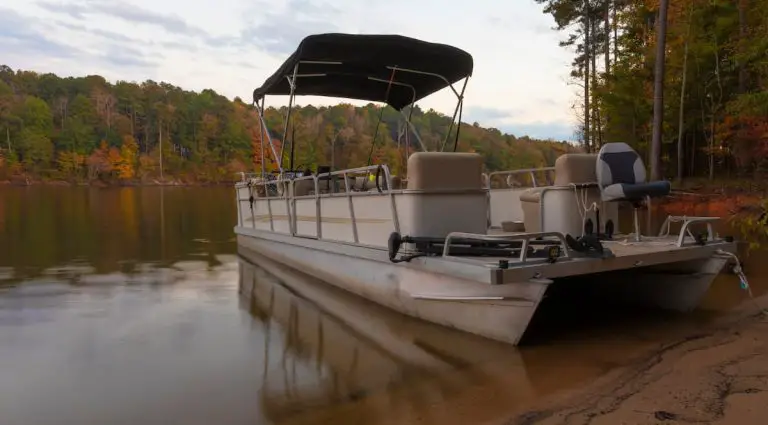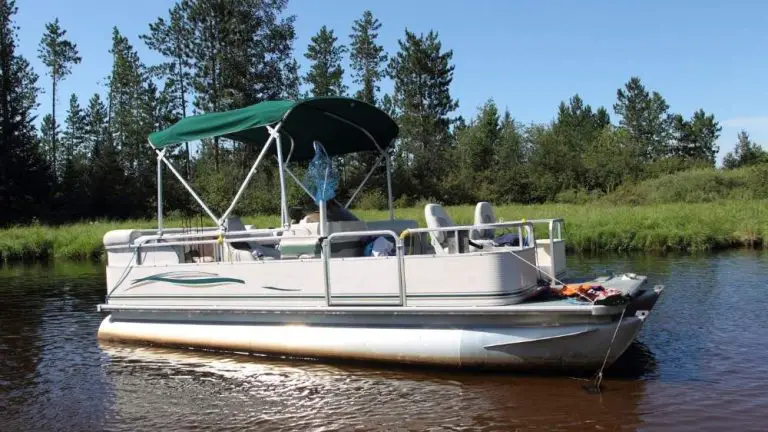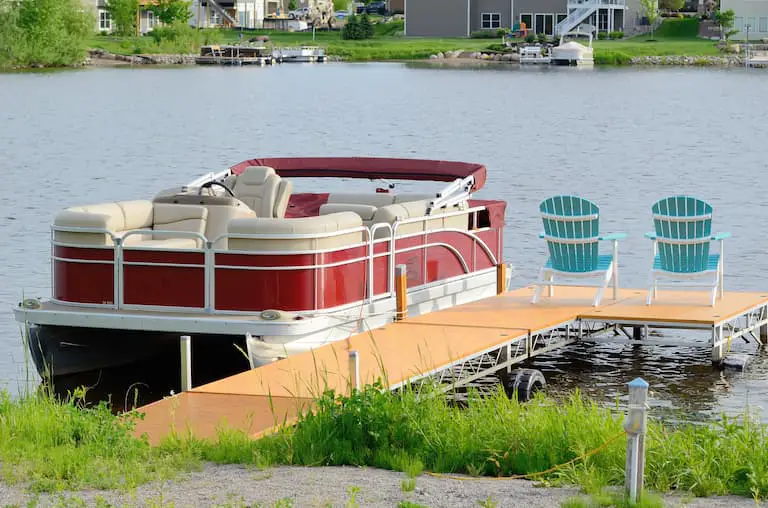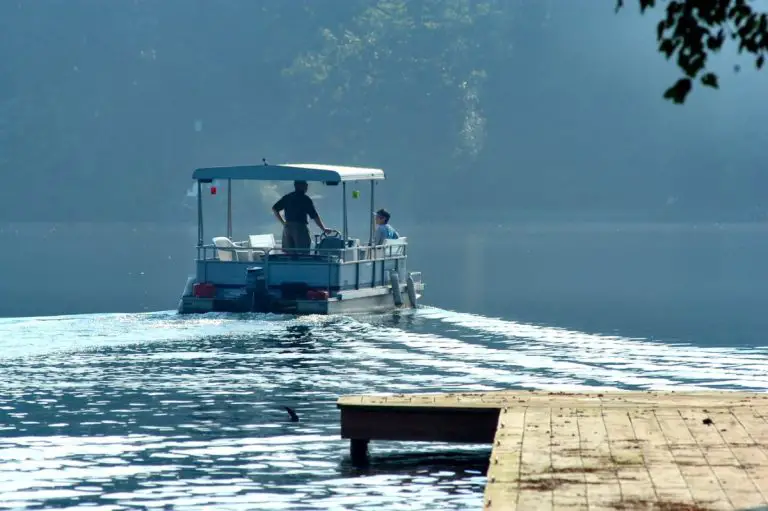How Hard Is It To Sink A Pontoon Boat? (Explained with Video)
A pontoon boat is a fun, safe, and reliable vessel that’s perfect for a family outing or spending a day out on the water fishing. Still, when poorly handled, they can sink. This may lead you to wonder just how hard is it to sink a pontoon boat?
It is hard to sink a pontoon boat compared to other boats because they have two independent hulls, each providing positive buoyancy. However, poor weight distribution, inappropriate handling, and improper motors can cause a pontoon boat to sink.
Often, when a pontoon sinks, it is due to human error, and you need not worry if you follow the manufacturer’s guidelines. So, let’s talk about why pontoon boats sink and how to prevent them from doing so.
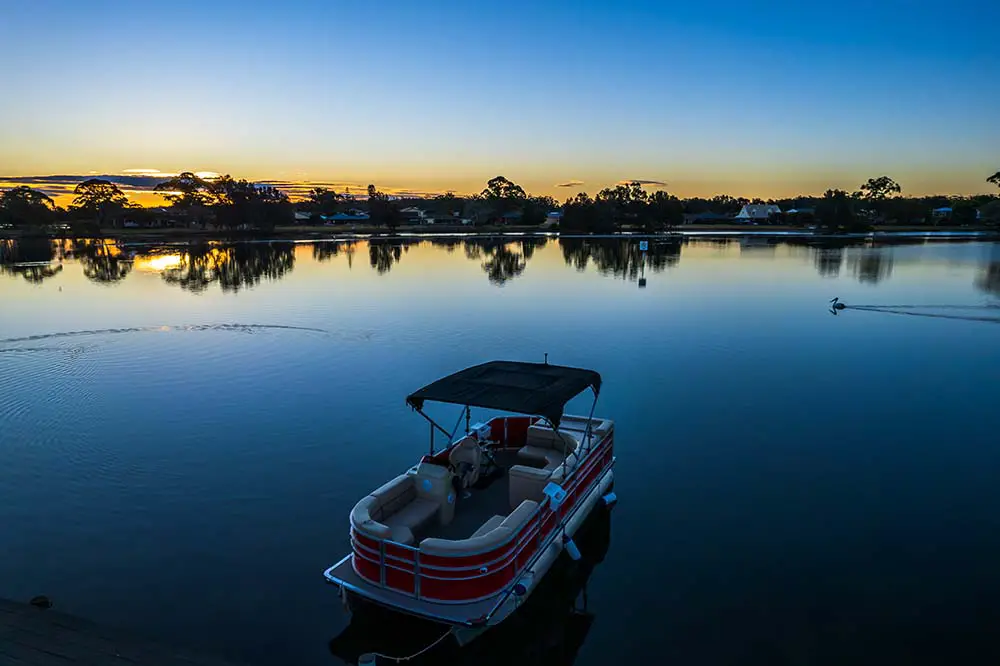
What Makes a Pontoon Boat Sink?
The pontoon boat has many things going for it. It is a great recreational boat for families with children, a great fishing boat, and a quiet comfortable ride for cruising. It is also an easy boat to maintain. However, its biggest selling feature is its safety record. A pontoon boat rarely ever sinks or capsizes.
So on the infrequent occasion that it happens, what are the most likely causes for a pontoon boat to sink?
A pontoon boat can sink due to overloading, poor weight distribution, or severe weather conditions. Also, poor maintenance of the pontoons can allow water to build up inside. In addition, poor handling and collision with other boats can cause a pontoon boat to sink.
The stability of the pontoon boat is almost guaranteed because it is safe even in semi-rough waters. The two separate pontoons or hulls allow it to move smoothly on the surface of the water. However, there are limits beyond which even a pontoon boat is at risk of sinking.
How To Prevent a Pontoon Boat From Sinking
Most pontoon boats sink due to human error. When handled correctly and in the right conditions, pontoon boats are pretty stable and very safe.
Before taking your pontoon out, there are a few things you can do to ensure you will be secure. If you adhere to the following, you can almost ensure that your pontoon boat won’t sink on you.
Avoid Overloading The Pontoon Boat
All boats are subject to maximum weight. Otherwise, they will sink.
Some pontoon boat models have a listed number of passengers they can carry. However, for most pontoons, the weight of passengers and cargo should be equivalent to the boat’s weight or less.
For example, a boat that weighs 2,000 pounds (907.18 kgs) can carry a load that weighs up to the same as the boat. If you go above this weight, the pontoon is considered overloaded and is at risk of sinking.
Unfortunately, overloaded pontoons appear to be okay before you set sail. However, once in motion, the vessel may be in danger of sinking
You can tell if your pontoon is overloaded by observing the waterline. The water line should remain below the middle of the pontoons.
Additionally, even if you have the right amount of weight on board you can still be in danger of sinking if you haven’t properly distributed that weight.
Fortunately, there is also a way to tell if you have poor weight distribution. Ideally, the waterline at the bow end should be lower than the stern end. In other words, the back of the pontoon boat should be heavier and ride slightly lower in the water than the front to allow the front of the pontoon to easily rise above the waves.
Mount the Right Motors on The Pontoon Boat
The motors you mount on your pontoon will determine the power you will have when riding the rough waters. If you have a motor with low horsepower, you risk sinking your pontoon boat when in rough waters.
When choosing the motors to use, you should consider;
- The boat’s size and capacity
- The activities you plan to do in your boat
- Water conditions
- Boat components
- Dealer recommendations
When you are in calm waters, you won’t need much horsepower, but ripples and waves can test the stability of a pontoon boat. If you cannot get enough momentum, you might go under.
So, larger pontoons naturally need a higher horsepower engine. The pontoon relies heavily on the motor to raise it above the water when moving. You can choose outboard motors anywhere between 40 hp to 200 hp and above.
Avoid Using A Pontoon Boat in Harsh Conditions
As a recreational boat, the pontoon boat comes with some restrictions. It is best for traveling through calm waters. However, its design allows it to ride above semi-rough waters, and many people assume it is okay to take the pontoon out when the weather or wind is heavily churning the waters. It is not.
If the forecast warns of a storm, you should avoid taking your pontoon out because it might sink if the conditions get too rough.
This video is a guide on how to drive a pontoon in rough waters:
Drain the Water From The Pontoons and Repair When Necessary
The hollow tubes on the pontoon tend to take in water over time, which will cause the boat to sit lower. The more water it takes in, the lower the boat. Unfortunately, the boat will sit even lower when you add your load. You may still be within the recommended weight, but the water in the pontoons will put your boat at risk.
So, be sure to unscrew the drain plugs once in a while to let the water out. This way, you can keep your boat’s pontoons floaty, just as they should be.
If you find your pontoon taking on water fairly quickly, it’s then time to find and repair the leak.
See also: How To Get Water Out of Your Pontoons? (Pontoon Boats)
Drive The Pontoon Boat Within the Recommended Speed Limits
Since pontoons perform best in shallow, calm waters, you need to be careful when driving over waves. Fortunately, pontoons quickly plow through the water because they have two hulls that keep most of the boat sitting up above the waves.
The top speed limit of most pontoons is 28 mph (45 kph). They have a turning radius that is not too sharp. So, it is possible to turn at high speed without flipping the boat. However, in rough waters, you may not be so lucky.
You also need to be careful when you encounter the wake of a larger vessel. Reduce your speed and lift the bow so that you can easily move above the wake and any subsequent waves. These maneuvers require skill and, sometimes, experience, so take things slow while you get the hang of it.
How Hard Is It To Sink A Pontoon Boat – Summary
The theory that pontoons do not sink is only accurate within specific limits. If you choose to test your boat by adding excess load or going out in bad weather, you may not get the results you hope for because your pontoon may sink.
However, when handled correctly and in the right conditions, the pontoon boat is one of the safest boats around with an excellent track record for boating enthusiasts.


